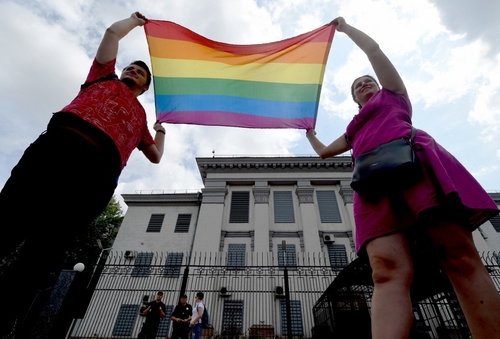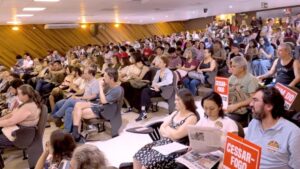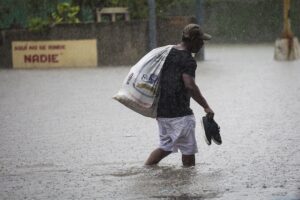
Russia took another step in restricting the rights of the LGBTQIA+ community in the country. On November 30th, Russia’s Supreme Court approved a law classifying the “LGBT movement” as an “extremist organization”, banning its activities on the territory of Russia.
The decision complies with a request from the Ministry of Justice, which submitted a petition on November 17, stating that the “activities of the LGBT movement” revealed “various signs and manifestations of extremist orientation”, including “incitement to social and religious discord”. The decision comes into force at the moment of its adoption, but has not yet been officially published on the Ministry of Justice’s “extremism” list.
In an interview with Brazil in fact, Alexander Verkhovsky, director of the Sova Information and Analysis Center, which researches issues linked to extremism in Russia, highlights that the incorporation of the “LGBT movement” into the list of extremist organizations is just a matter of time and that the law will soon begin to come into force. From this, “anyone who does anything related to LGBT issues can be charged with ‘participation’ under article 282.2 of the Penal Code.”
According to this article of the Criminal Code of the Russian Federation, crimes of an extremist nature are understood as crimes committed for reasons of political, ideological, racial, national or religious hatred or enmity, or for reasons of hatred or enmity against any social group.
In practice, LGBTIQA+ activists in the country – and the use of symbols related to the LGBTIQA+ community – run the risk of being accused of participating in the activities of an extremist organization, and the qualification of a crime includes “inducing or otherwise involving” others people in such activities.
Researcher Alexander Verkhovsky believes that the first to be affected by the new rule will be activists for LGBTQIA+ causes, but it is unlikely that law enforcement will have widespread use at first.
“My prediction is that it will start with a few militants. There will not be a truly widespread use of article 282.2: law enforcement agencies do not have the strength for that now. Although it largely depends on the case and the particular homophobia of a given police officer,” he argues.
In addition to the broad and vague conceptualization of extremism, the decision also does not specify what it classifies as a “movement” and what the “activities” of this supposed organization would be. For Evelina Chayka, an activist with the LGBT rights organization EQUAL PostOSt, the measure is also a way of persecuting dissidents from the Russian government.
“For us it is clear that there is not and cannot be any international LGBT movement, and we understand that based on this non-existent idea they will begin to persecute and repress everyone who needs to be persecuted, all dissidents, and, first of all, people LGBTQIA+ people living in Russia,” the activist told Brazil in fact.
The decision is not the first measure by Russian authorities to restrict the rights and freedoms of LGBTQIA+ people. In November 2022, a law banning “LGBT propaganda” was passed. In July of this year, a bill was adopted that prohibits sexual reassignment surgery in the country.
:: Russian Parliament considers expansion of law banning ‘LGBT propaganda’ ::
In official statements over the past few years, Russian President Vladimir Putin has always treated the restriction of the rights of sexual minorities as a defense of traditional and family values, associating LGBTQIA+ freedoms as an interference of Western values in the tradition of Russian culture.
“Marriage is the union of a man and a woman. In relation to the family it may be a little different. This is the right idea and should be supported. As for ‘father number one and father number two’, I have already said it publicly and I repeat: as long as I am president we will not have this. We will have ‘father’ and ‘mother'”, Putin said in 2020.
As early as 2021, the Russian president classified transsexuality as an “obscurantism” against which traditional Russian values must defend themselves.
“I have a traditional approach: a woman is a woman, a man is a man. A mother is a mother. A father is a father. I hope that our society has internal moral protection, dictated by our traditional religious confessions of the Russian Federation . […] All the peoples of the Russian Federation, I would like to emphasize, have a kind of internal moral protection against this obscurantism,” he said.
The set of measures against sexual minorities in the last year is part of the context of the resurgence of conservatism in the country, strengthened by the war in Ukraine. As Deputy Alexander Khinshtein, head of the State Duma Committee on Information Policy, stated on the occasion of the discussion on the ban on “gay propaganda”, the “operation [militar na Ucrânia] It is occurring not only on the battlefields, but also in the minds and souls of the people.”
The vice-president of the Duma, Pyotr Tolstoy, classified what he called “propaganda and LGBT approval” as an “instrument of hybrid warfare”. According to him, it is the future of Russia that “is at stake.”
For researcher Alexander Verkhovsky, however, the Kremlin’s campaign against the rights of the LGBTQIA+ community is more related to a “civilizational battle” against the West than directly to the war in Ukraine.
According to him, the whole fight for moral conservatism is a ‘positive’ part of the anti-Western ‘civilizational confrontation’ agenda: “Apparently, sometimes it is necessary to add fuel to this side of the fire,” says Verkhovsky.
“There is no direct connection with the war. If the war ends suddenly tomorrow, the idea of ’civilizational clash’ will not go anywhere,” he adds.
First effects
Although it is not yet clear what the effect will be on LGBTQIA+ people in Russia after the classification of “extremism”, the decision already took effect in the first days of the measure being announced.
On December 2nd, just two days after the Russian court’s decision, there were cases of police raiding nightclubs where LGBTQIA+ parties were taking place in Moscow and Saint Petersburg under the pretext of looking for drugs. Visitors’ passports were photographed by police officers.
Activist Evelina Chayka told the Brazil in fact that in the first days after the decision, a traditional gay nightclub in Saint Petersburg closed its doors.
“We know that they closed one of the oldest gay nightclubs in St. Petersburg, which initially had been dealing well with all the waves of homophobia that happened in Russia, and now just after a day or two (of the new law) it has closed its doors. According to the official version, the owner refused to extend the lease of the space, but it is clear that this was not what actually happened”, he states.
According to her, LGBTQIA+ activism in Russia has always run a certain risk of exposure and being framed by justice, but now this risk has expanded to ordinary people who have nothing to do with organizations or social movements defending the rights of sexual minorities. .
“People who simply go to nightclubs or community meeting places (LGBT) were not considered at risk, at least in general terms. Now it turns out that security agents have entered these spaces, nightclubs, saunas and simple meeting places, at Sometimes they put everyone against the wall, sometimes they take photos of their IDs, and then release them. We don’t know if these people will be affected when the Court’s decision comes into force, or if it is just an act of humiliation”, he says.
Evelina Chayka states that there are several scenarios regarding this decision and what it can be used for. The most pessimistic scenario, according to her, would be the prohibition and possible mass detention of any manifestation of LGBT symbols, such as “the simple use of a rainbow-colored bracelet”, for example.
“There is a milder scenario, which would be to take citizens’ attention away from the presidential elections, take the focus off the war in Ukraine, take some cases as an example, create fear, and then forget about it”, he adds.
Editing: Rodrigo Durão Coelho
Source: www.brasildefato.com.br

